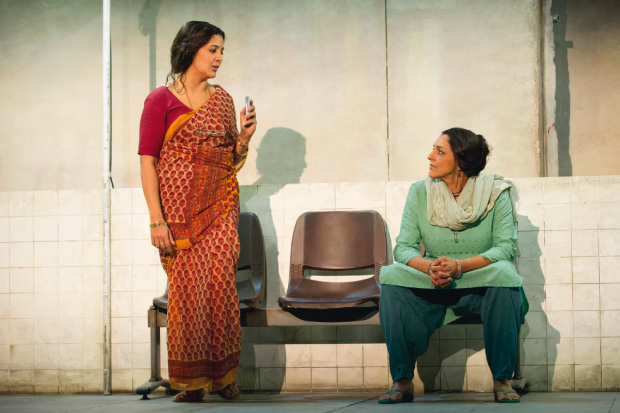Hand it to the Americans. They know how to hype a young talent to death. The latest to be asphyxiated by the literary establishment is Branden Jacobs-Jenkins. He’s written six off-Broadway plays (one adapted from a script by Boucicault), and won a ton of awards and prize money. Most of the English ‘critics’, if one can call them that, have meekly regurgitated the American propaganda. Gloria, which was nominated for the Pulitzer, now arrives at Hampstead.
The setting is a snobbish New York magazine, which is absolutely and emphatically not the New Yorker, according to Jacobs-Jenkins. (Before turning to drama, he worked at the New Yorker for three years.) We’re in a poky back office where three bored sub editors carp and backbite about their jobs, their drink problems, and their difficulties securing book deals. Their personalities have too many attributes in common: they’re glib, self-centred, lazy and foul-mouthed. There’s no wit or warmth in the building and no trace of romance between any of the characters. And though it’s fun to watch these over-educated snobs carping and whining for a few minutes, their boorish petulance soon becomes predictable and alienating. All of them hate everything in sight — the office, the editors, the interns, each other — so why don’t they find a magazine with intelligent colleagues, a friendly atmosphere and fun bosses? Trust me, they exist.
Then comes a mad plot twist. Someone goes nuts and shoots dead a dozen people. Three of the survivors write about the atrocity and try to flog their stories to publishers and movie agents while bickering and backbiting just as they did before. Pretty cynical stuff. The catty tone of the piece never varies and we gain no insight into the killer’s motives. There are two principal faults here, thematic and structural. The theme — yuppie writers moaning about yuppie hardship and writing problems — is attractive to only a puny slice of the theatre-going public. But the structural flaw is fatal to the play’s artistic success. There’s no central character. Act One is dominated by two piles of spite, Kendra and Dean. They’re sidelined in Act Two where Nan, an off-stage witness to the massacre, takes centre stage. Nan is then side-lined in Act Three when Lorin, a dim pest left over from Act One, becomes the main figure. Terrible ground plan.
A further fault compounds this problem. The actor who plays the killer also doubles as one of the witnesses. How crazy is that? Imagine a drama about JFK where the same actor played Jackie Kennedy and Lee Harvey Oswald. That’s how crazy. Curiously, the dramatist has detected these flaws but approves of them. ‘Tonally it morphs continually,’ he says in the programme notes. ‘The play denies resolution on a narrative level,’ he adds. What a twit. Can’t he hear himself talking? A play should achieve ‘resolution on a narrative level’ not ‘deny’ it. But the hype has done its work and deafened the poor chap to the sensible advice his instincts are giving him. An artist who loses contact with his critical faculties also loses his art but in this case I doubt if the forfeiture is that great.
Rotterdam examines a community of gay English women living in Holland. Alice is a likable Sloane whose family have no idea she’s a lesbian. She’s about to drop the L-bomb on them when her girlfriend, Fiona, drops the M-bomb on her. Fiona is a man, she announces, trapped in a woman’s body. She plans to take hormones, shrink her breasts, grow a beard, some testicles, a penis, the works. For Alice this changes everything. Instead of living with a girlfriend, Fiona, she now has a boyfriend named ‘Adrian’. Meanwhile Alice is being seduced by a sweet but crazy girl from her office. The witty, fleet-footed script is arranged with great simplicity and elegance. And it tugs constantly at the heart-strings. One feels deeply for Fiona’s desire to embrace her true nature and one agonises over the timid Alice, whose world has been turned upside down.
Even a hetero chap like me feels involved because the drama tackles head-on a question that has always puzzled the non-gay community. Aren’t lesbians just straight men in disguise? After all, they favour short haircuts, wearing trousers and kissing girls. This is the very claim made by Fiona/Adrian as she urges Alice to accept her new self. Alice, she insists, was never really a lesbian because she fell in love with someone whose true identity was male. The author of Gloria would profit from seeing this play because the writer, Jon Brittain, knows exactly how to create attractive personalities. All his characters are damaged but kind-hearted people striving to be less damaged and more kind-hearted. Easy, really. A good play improves your day. A great play improves the rest of your days. And here it is.







Comments